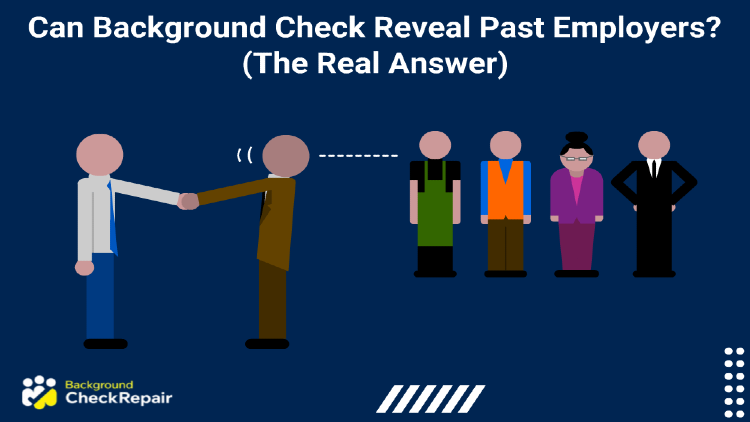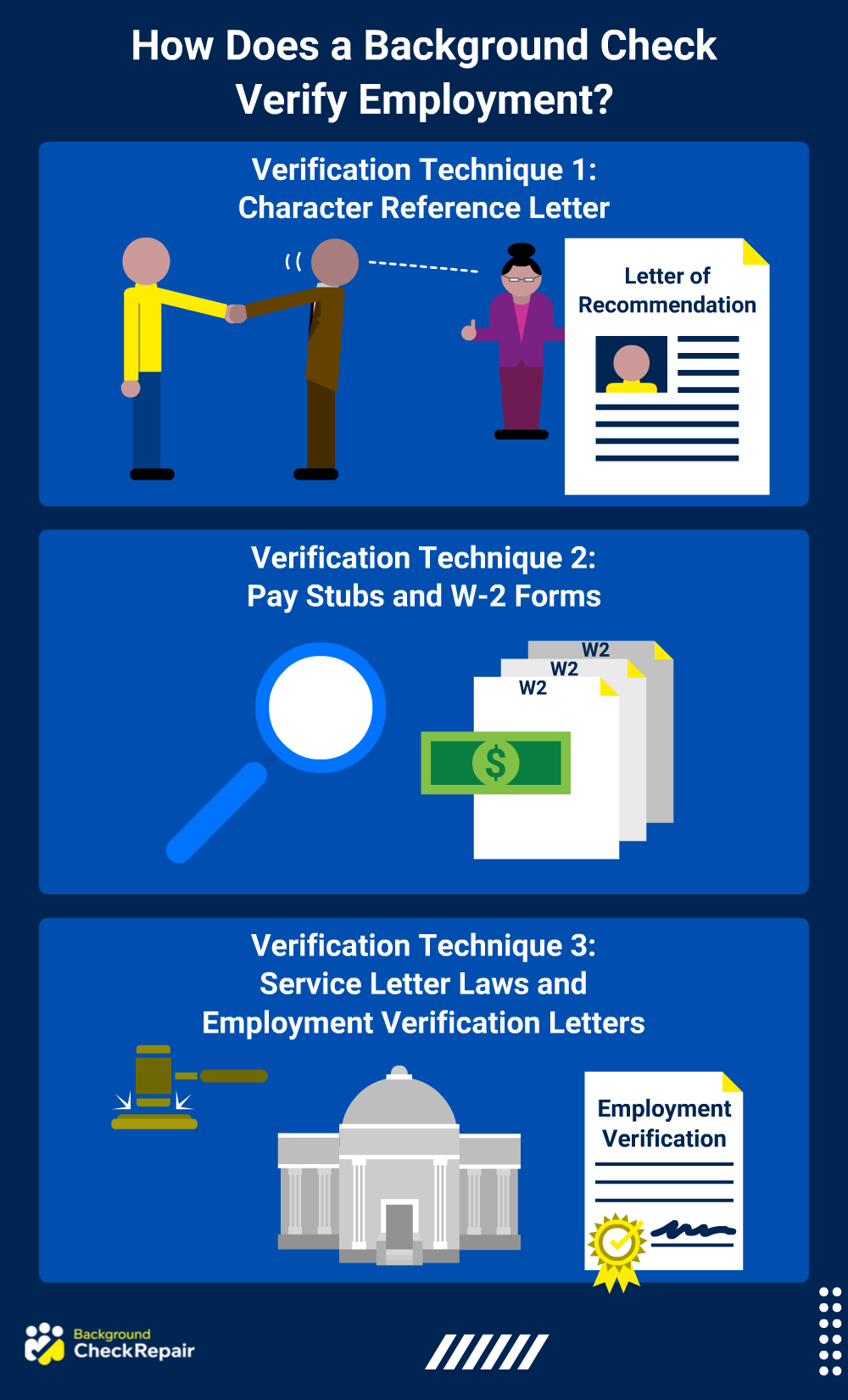
Many people, when undergoing a screening process for employment, often wonder, “can background check reveal past employers?” But, learning the answer to this question depends on the type of search being conducted and why.
Knowing the real answer to ‘can background check reveal past employers,’ and what appears on a background check can help applicants identify which verification processes to expect when applying for certain jobs and positions.
Will a Background Check Reveal Past Employers and Jobs?
Because previous employment history matters in some cases, an employment background check may uncover past employment details, revealing information such as the position held in the business, responsibilities that were assigned and performed, corresponding dates, and even where someone has worked when cross-referenced with employer websites.
Background checks, in their capacity, concentrate on scrutinizing public records, such as credit and criminal history, both at state and federal capacities. This almost always includes finding recent arrests as well.
However, they are also dictated by need. For example, a person applying for a commercial transportation job will likely be checked for licenses and undergo a drug test as part of the background check process.
For this reason, some background checks will reveal past employment. But others will not.
Background Check Limitations
Currently there is no dedicated system that records every significant job position an applicant has held in their career.
As far as the depth of obtainable information goes, federal law does not provide any rules or restrictions governing how much or how little an employer can probe concerning previous jobs. It essentially comes down to the depth an employer is willing to go in an effort to hire the most deserving candidate.
How Does a Background Check Verify Employment?
There are some standard verification techniques used to confirm former employment in a background check. The most common is a credit check.When a pre-employment background check explains that a credit check is part of the comprehensive search, the credit check will list previous employers.

However, other methods are also used by employers. For example, hiring managers may contact former employers listed in the applicant’s resume. Such consultation could shed light on crucial employment details, such as position held, responsibilities, salary, and reason for leaving.
Deeper consultations, especially those conducted by third party professionals, that could obtain more information, like the applicant’s eligibility for rehiring and their ability to complete responsibilities.1
Such a check is part of the answer to can background check reveal past employers.
Additional techniques can also be used, but most require the applicant to provide the verification, including:
Verification Technique 1: Character Reference Letter
An employer can also ask for a letter of reference in an attempt to understand an applicant’s workplace personality, working attitude, relationship with other employees, and other essential attributes. From colleague, professor, mentor, to supervisor, a character reference letter may be written by different individuals on behalf of the applicant. The employer reserves the right to contact these people to establish the truthfulness of the letter.
Pay stubs and a W-2 form prove former work relationships beyond any doubt, if an applicant chooses to use them as verification. One of the cases where a W-2 intervenes is whereby a former employer is no longer operational, thus unreachable. The W-2 reveals various monetary aspects of employment, including salary, taxes, and other benefits. However, employers do not have any right or ability to access these tax forms using any background check process.
The W2 form can be used to verify previous employment, but they are not considered public records and will not appear on an employment background check.
Verification Technique 3: Service Letter Laws and Employment Verification Letters
This is a letter issued to an employee by their former employer upon termination of their working relationship. The letter spells out various points of interest such as salary, work relationship and the reasons behind the end of employment. In the same spirit, the employer may ask for an employment verification letter, prepared by HR to disclose on the employment status, the length of time spent at the company, and salary earned.
To achieve optimal integrity of the screening process, many employers choose to seek the services of 3rd party background check companies to perform employment screening alongside the normal background checks. 3rd party companies are professionals who can uncover essential information that an employer may miss if they undertook the screening themselves. A background check company will go ahead to provide a screening report for review by the hiring managers.
Can background check reveal past employers? Yes, certain types of checks will include all former employment records. If applying for a job that includes the following background searches, the applicant’s work history is included.
Credit Background Check
Credit checks are common for positions related to handling money, controlling investments and other positions of financial trust. In addition to a criminal history search, typically, these background checks include the information that is available to lending institutions, which will include a person’s job history and possibly their IRS tax records (depending on the position).
Additional information revealed in a credit check include address and former addresses if applicable, security number, unpaid debts, late payments, defaulted loans, and student loans, to name a few.
Credit checks are becoming more common during the pre-employment process and can even be the cause of failing a background check after a job offer has been made. According to a recent survey, 1 in 10 unemployed respondents in the low and middle class have been told they did not qualify for a job at least once because of their credit history.2
But, the Fair Credit Reporting Act requires an employer to obtain consent from the applicant before reviewing these records, and also requires an explanation is adverse action is taken following the results.3
Fortunately, U.S. citizens have a lawful right to one free, annual credit check report, in order to ensure that the information contained on the report is correct.
A credit report can reveal past employers, so if the employment background check includes a credit history search, previous employers can show up.
FBI Background Check
For positions that relate to national security, the FBI performs extensive background checks. Moreover, the agency has access to sealed and expunged records, and will often perform interviews with friends and family in order to decide trustworthiness.
Being completely honest about all employment (and everything, since the FBI can find it out anyway) is the best way to approach these types of checks.
It’s important to note that an FBI background check is not the same thing as a fingerprint background check conducted by the FBI, which is a major factor in determining the reach of an FBI background check. Simply put, a fingerprint check is a national search of criminal records.
Fingerprint checks are also sometimes referred to as level 2 background checks in some states such as Florida. In contrast, level 1 background checks do not involve fingerprints and are limited to a single area, county, or state.
Legally Verify Employment: Background Check Laws and Processes
Laws concerning how to verify employment are designed to protect individual rights, but they vary by state.
Public Records Search
A public records search is available to both individuals and employers and can be accessed by either, usually for a small fee. These include criminal records that haven’t been expunged or sealed, voter registration records, business licenses, property tax payments, and also residency information.
Public records are generally controlled and housed by county clerk’s offices, and require basic forms to process the request.
Using public records, an employer may, for example, discover that the applicant pays child support on time, see police reports (in some instances) warrants, pending court cases, or find out whether the applicant votes or owns property.
Notably, there are certain state and federal restrictions that control access of public records. Under Michigan official public records guide, for example, the Executive Directive 2019-10 prohibits employers from probing into the pay history of applicants.
Additionally, the Driver’s Privacy Protection Act denies access to driver databases, but there are exceptions. Under the law, employers who need certification of a commercial driver’s license can access state-gathered public records regarding vehicles.4
Overall, in the US, the Freedom of Information Act (FOIA) controls access to public records, and this means that employers need to satisfy certain conditions to gain access to individual profiles, which is generally fulfilled by obtaining consent.
The E-Verify website is used to confirm work eligibility for individuals in the U.S. and is usually used in addition to a background check for employment.
In Company Verification
There are several ways that a potential employer may access information about former employment, including in company verification.
An employer can choose to contact former workplaces of a candidate, as listed in the candidate’s application, to verify employment. The employer asks for information such as title held, dates of employment, reason for leaving and salary paid.
Third-Party Verification Companies
Many companies employ third party agencies to perform their background checks. Since state laws vary, these reliable agencies are able to comply with all states’ legalities concerning public record searches.
So, “Can background check reveal past employers?” Yes, when third party companies are specifically contracted to present a list of previous employers for review.
Some third party companies are able to unearth crucial pieces of information, including any disciplinary actions taken against the employee, performance and skill metrics, and the reason for leaving the company.
Confirming Work Eligibility
All employers are legally required to process I-9 forms for each employee, which provides proof of identity and authorization to work in the United States. The form features an attestation by the employee that they are eligible to work in the country. The individual in question also provides supporting documents like a driver’s license, green card, social security card, state-issued certified birth record issued, and US passport.
The law requires that the employer file the form and copies of all supporting documents, and verify the truthfulness of these submissions using a system like E-Verify.
How E-Verify works
E-Verify is an online platform that employers utilize to check if their employees and applicants are eligible to work in the US. The program is enabled by Illegal Immigration Reform and Immigrant Responsibility Act of 1996 (IIRIRA) for use across all US states and territories. With E-Verify, registered employers can inspect the I-9 forms of employees against Social Security Administration records as well as records in the Department of Homeland Security.
Who Can Use E-Verify?
- Employers who have been instructed by the court to verify employee eligibility as part of a ruling.
- Employers hiring in states that have set the use of E-Verify as a mandatory hiring procedure
- Employers who obtain federal contracts containing the Federal Acquisition Regulation (FAR)
- Enrolled employers seeking to verify the eligibility of employees
An individual looking for a job can test the waters by conducting an employment and credit report background check on themselves. By examining the public records contained in a background check, including probation and dropped charges, they can determined whether or not they will pass.
Although most basic background checks will not include all previous employment details, the real answer to ‘can background check reveal past employers,’ is that yes, it can, depending on the type of check and history search that is performed.



